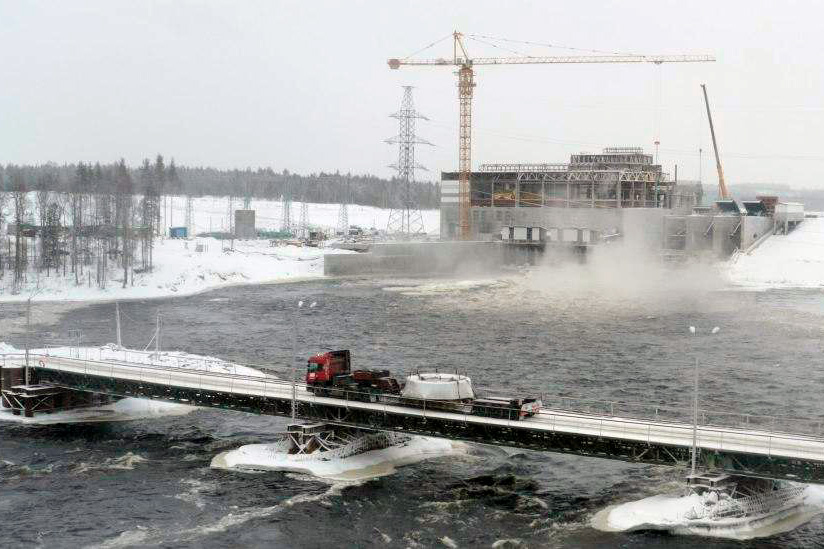We warned in vain that hydropower construction should be halted to prevent massive outbreak of COVID-19 at Beloporozhskaya hydroelectric station.
A large outbreak of coronavirus was detected in Karelia, at the construction site of the Beloporozhskaya hydropower station, with number of COVID-positive patients hospitalized from the construction site coming to 79 by the morning of June 4. Two months ago Eugene Simonov –international coordinator of the Rivers without Boundaries coalition published a warning to Karelia authorities insisting that precautions should be taken and construction should not be rushed to meet deadlines, unless the authorities want to risk of developing a COVID hotspot. Hydropower construction was rushed to launch the plant by centennial anniversary of Karelia Republic and coronavirus arrived as predicted.

The worsening of the situation was announced on June 4 by the head of the republic Arthur Parfenchikov, when coronavirus was confirmed in ten more shift workers working on the construction of the Beloporozhskaya hydropower station, bringing total numbers of infected to 79. The head of the republic noted that today the evacuation of workers from this facility has been completed “In addition 170 people were stationed in observatories in Kem, Medvezhyegorsk, Kondopoga, Belomorsky, Segezha regions and in Petrozavodsk ,” Parfenchikov said. – 79 people were hospitalized. Of these, 23 people were placed in the Hospital for War Veterans, one person is in the Republican Infectious Disease Hospital. The rest were sent to specialized departments of district hospitals: 13 patients in Segezha, 10 in Kostomuksha, and two in Belomorsk. ”
Since the beginning of the pandemic in the republic, where overall preparedness was rated one of the best among all provinces of Russia, coronavirus infection has been confirmed in 548 people, including 56 children. As of now at least 15% of those originated from a single construction site, where a newly built dam was breached by flood on March 22, coinciding with the first cases of coronavirus in the republic. The authorities and companies involved faced a choice between temporary halting already delayed construction to avoid influx of workforce from outside of the region or an option of rushing repair works and last stages of construction to meet deadlines imposed earlier by national government (construction is supervised by the Secretary of Security council of Russia, Patrushev).
The 49 MW Beloporozhskaya hydroelectric stations, initially designed by local NordHydro Company, was the first project financed in Russia by the New Development Bank of BRICS, in arrangement which also involves Eurasian Development Bank, International Investment Bank, SINOMEC and other Chinese firms. It is also considered one of the projects within the framework of the Belt and Road Initiative.
Its political importance was blown out of proportion, for in reality this is a tiny inconsequential dam, which was built on remains of its unfinished Soviet predecessor and may add 0.2% to production of Northwest Energy system of Russia. But this hydropower capacity will come at a price of 240 000 rubles/ KW (USD 4000/KW) making it 2-3 times more expensive than solar of wind energy. No one would notice if construction was halted to survive the period of the pandemic.
Nevertheless, given that this politically motivated project was already one year behind construction schedule and that its launch was perceived as the main highlight in celebration of 100 years of Soviet Karelia Republic, the dam construction company opted to rush construction despite risks of coronavirus spread by shift workers. This behavior is not dissimilar from reckless behavior of other hydropower companies around the world pushing for accelerated construction despite concerns that it increases infection threats to their workers and local communities. Recently the International Hydropower Association, Hydropower Association of Russia and similar lobbyist organizations from 10 other countries came up with a call to invest into hydropower as a part of COVID-19 recovery efforts. The incident at Beloporozhskaya Hydro shows questionable value and increasing risks of such approach.
Parfenchikov said that “Presently at the construction site there were 23 people servicing the hydroelectric power station. Today the final disinfection of the working camp begins. Then the facility will be ready to accept a new shift of workers with a negative test for coronavirus… ”
How do you call people who ignore advice from others and then refuse to learn from even their own mistakes?
Source RwB own data, Sibreal, and Regnum

